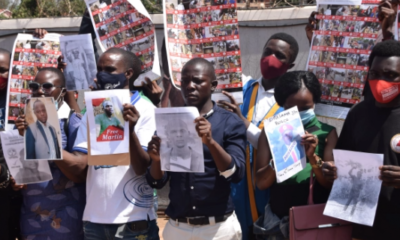
Streamlining or Sacrificing? Uganda’s UCDA Merger Sparks Controversy
By Wabusimba Amiri
The debate over Uganda’s decision to merge government agencies, particularly the Uganda Coffee Development Authority (UCDA) into the Ministry of Agriculture, Animal Industry, and Fisheries (MAIF), has become a lightning rod for a much deeper national conversation.
While the government presents this merger as a strategic move to streamline operations and reduce public spending, the integration could erode the specialized focus UCDA has long provided to Uganda’s coffee sector a pillar of the country’s economy.
The proposal has garnered far more resistance compared to other consolidations, such as the quieter merger of the Uganda Wildlife Conservation Education Centre (UWEC) into the Uganda Wildlife Authority (UWA).
This stark difference in MP’s reaction suggests that there may be financial incentives or political calculations at play, especially with the 2026 elections on the horizon.
As the UCDA merger bill moves forward, stereotyping has dominated discussions, overshadowing a critical examination of whether the merger aligns with Uganda’s long-term development goals.
The media spotlight has brought many MPs’ motives into question, fueling suspicions that financial incentives, rather than public interest, may be driving opposition.
The broader implication is unsettling: is this merger being resisted on principle, or are certain MPs leveraging the moment to build their anti-government credentials in preparation for the upcoming elections?
The debate has consequently polarized Parliament, with opposition MPs leveraging the merger as a critique of the ruling National Resistance Movement (NRM), which they allege is mismanaging public resources.
However, this also presents a dilemma, as MPs have long criticized government expenditure and inefficiency, which the UCDA merger aims to address.
Thus, the opposition’s challenge is whether to prioritize Uganda’s broader developmental needs or exploit the merger for political mileage.
The merger of UCDA into MAIF, as well as other agencies, aligns with Uganda’s constitutionally mandated goals of efficient public administration.
In 2018, Cabinet passed Minute No. 85 (CT 2018), endorsing the Government Rationalization and Mergers Policy.
This policy was approved by the National Planning Authority (NPA), mandates that 97 agencies, including UCDA, merge into their line ministries to reduce redundancy and save public funds.
President Museveni supports this strategy, aiming for a streamlined public sector that upholds Uganda’s Vision 2040 goals for fiscal discipline and resource optimization.
While the Coffee Act 2021 grants UCDA regulatory authority, integrating it into MAIF centralizes oversight within agriculture.
This move is expected to streamline policy, enhance accountability, and reduce costs. However, critics argue that UCDA’s specialized focus may diminish within MAIF’s larger bureaucratic structure a concern based on international precedents.
This critique echoes the experience of other countries that attempted to streamline their administrative frameworks by merging government agencies, with varying degrees of success.
Kenya and Malaysia for instance showed that merging agencies can bring fiscal benefits but must be approached with caution. Kenya merged agricultural agencies under the Ministry of Agriculture in 2013 to cut overlapping roles.
Although this move saved costs and improved policy cohesion, it led to concerns that specialized sectors like coffee lost focus and support.
Malaysia’s consolidation within its Ministry of Trade and Industry achieved budget savings and policy alignment but retained specialized functions, which allowed core mandates to continue effectively.
These examples suggest that while Uganda might achieve savings, success depends on maintaining UCDA’s focus within MAIF. Savings could be redirected to critical sectors like health and education.
For Uganda’s MPs, the UCDA merger serves as a litmus test of political intentions, particularly with the 2026 elections approaching.
Some MPs view opposition to the merger as a way to underscore NRM’s perceived inefficiency. Ironically, many of these MPs have previously advocated for cutting government expenses a goal supported by the UCDA merger.
Thus, MPs face a choice support Uganda’s fiscal interests or use the merger as political leverage.
Additionally, MPs question why UCDA is prioritized for merger when other high government expenses remain, particularly in the Office of the President and Parliament.
Asking citizens to accept austerity while preserving these costs seems inequitable. However, the UCDA merger could set an example for broader fiscal restraint, encouraging a reassessment of government spending priorities.
The silence that surrounded the UWEC-UWA merger could have reflected the absence of financial or political incentives that would galvanize Mps.
In contrast, UCDA’s merger has provoked opposition amid rumors that some MPs may have received incentives to resist the merger, further casting doubt on whether all opposition to the merger stems from legitimate concerns.
It remains to be seen if the MPs are prioritizing their principles or merely positioning themselves strategically for 2026 general election.
The UCDA merger has brought Uganda’s coffee sector stakeholders to the forefront of the debate.
The coffee industry fears that integrating UCDA into a larger ministry will erode the focused attention and resources currently dedicated to coffee sector development.
However, merging UCDA with MAIF could save costs by eliminating redundant roles. With fewer administrative expenses, resources could be reallocated to vital areas such as healthcare, education, and infrastructure.
Integration could align coffee policies with broader agricultural objectives, promoting cross-sector benefits and improving accountability under MAIF’s oversight.
With Uganda’s 2026 elections approaching, MPs face a choice either support Uganda’s fiscal interests or use the merger as political leverage.
This decision also invites a larger question: whose interests does the 11th Parliament truly serve?
While the merger is ostensibly about efficiency, the focus on stereotyping over policy raises suspicions that financial incentives may be influencing parliamentary positions, as implied in media coverage.
As public stewards, MPs must consider whether their actions align with Uganda’s developmental aspirations or reflect personal or political motives.
Ultimately, this moment offers a test of MPs’ commitment to fiscal responsibility, a principle that could rebuild public trust and demonstrate their dedication to Uganda’s long-term growth.
Author is a diplomatic Student, Journalist, political analyst and Human Right activist.Tel: +256775103895 email: Wabsuimbaa@gmail.com
Post Views: 1,380
Streamlining or Sacrificing? Uganda’s UCDA Merger Sparks Controversy
News
Ugandan Citizen Abducted, Held in Secret Detention for Three Months, Sparks Outrage and Calls for Justice

A disturbing new case of unlawful detention has surfaced, highlighting the ongoing human rights crisis in Uganda. A Ugandan citizen was reportedly abducted and held in a secret facility, known as a “safe house,” for three months, only to be released without charge or explanation. This incident, reported by NTV Uganda, has sparked widespread condemnation and renewed calls for accountability regarding human rights abuses in the country.
While the details surrounding the abduction remain unclear, reports indicate that the individual was taken without due process and held incommunicado—an action that has long been condemned by human rights organizations. The victim’s release, with no charges filed and no clear justification, has angered activists and citizens, who view this as yet another case of egregious abuse of power by the state.
“This is a recurring pattern,” said one human rights activist. “Abductions, secret detentions, and unexplained releases have become all too common in Uganda. These acts violate fundamental human rights and erode public trust in the justice system.”
The use of “safe houses,” unregistered detention facilities reportedly operated by security forces, has been a focal point in numerous allegations of torture and illegal imprisonment. Despite repeated calls from both local and international organizations for their closure and accountability for those involved, little action has been taken to address these violations.
This case underscores the urgent need for reform within Uganda’s security apparatus and greater accountability for human rights abuses. Observers hope that drawing attention to these injustices will spur concrete action to bring those responsible to justice and ensure the protection of basic human rights.
As frustration mounts, calls for both domestic and international pressure to hold the government accountable for such crimes grow louder. “One day, there must be accountability for all these crimes against our people,” stated one social media user, reflecting the sentiments of many Ugandans.
News
NUP Gathering Disrupted: Kyagulanyi Alleges Security Force Harassment and Arrests

National Unity Platform (NUP) President Robert Kyagulanyi has accused Ugandan security forces of using excessive force to disrupt a planned NUP gathering. The allegations were detailed in a statement shared on Twitter, following an event held to honor children of NUP supporters who were killed, disappeared, or detained for their political beliefs.
According to Kyagulanyi, security personnel, under the command of an officer identified as Asiimwe, carried out a preemptive operation early in the morning upon learning of the NUP’s plans. The forces allegedly stormed the premises, arrested workers, and deployed tear gas to disperse those present.
“The criminals under the command of one Asiimwe deployed early morning, arrested our workers, and threw tear gas into our premises. They’ve cordoned off the premises and blocked all people from accessing the place,” Kyagulanyi wrote.
Among those reportedly arrested were Saava Peter, Mudenya Samson, and Turyasingura Samson. Kyagulanyi claimed the detained workers were subjected to beatings and interrogated about their political affiliations, with security operatives labeling them as terrorists.
“These JATT operatives asked the workers who they support politically, branding them terrorists and criminals—their only crime being that they work with us. You can imagine the indignity!” Kyagulanyi lamented.
This incident adds to the growing tension in Uganda’s political climate, where opposition parties frequently accuse the government of stifling dissent. Despite the challenges, Kyagulanyi ended his statement with a message of defiance and optimism, proclaiming, “UGANDA WILL BE FREE.”
NUP Gathering Disrupted: Kyagulanyi Alleges Security Force Harassment and Arrests
News
Sudan Demands Apology from Uganda Over Army Chief Muhoozi Kainerugaba’s Threat to Invade Khartoum

Sudan has demanded an official apology from Uganda over “offensive and dangerous” comments made by the chief of Uganda army staff, who threated to invade Khartoum, the Sudan Tribune has reported.
General Muhoozi Kainerugaba, son of Ugandan President Yoweri Museveni and CDF of the Ugandan army, posted two comments on the X platform on Tuesday in which he threatened “to capture Khartoum” with the support of the US President elect Donald Trump after he takes office. The posts were deleted later.
“The government of Sudan demands and official apology from the Ugandan government for the offensive and dangerous comments of the army commander,” Sudan’s foreign ministry said in a statement that the Sudan Tribune said it has seen.
Sudan Demands Apology from Uganda Over Army Chief Muhoozi Kainerugaba’s Threat to Invade Khartoum








